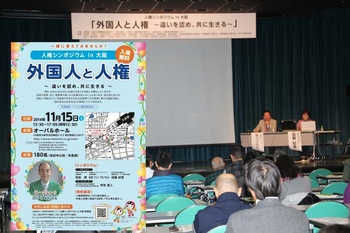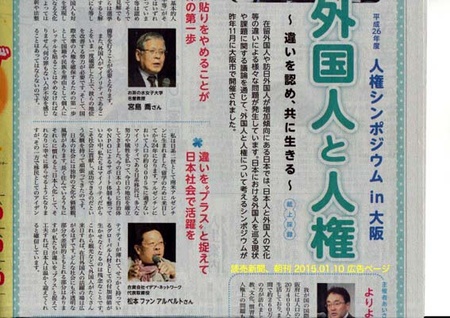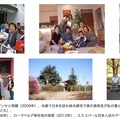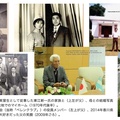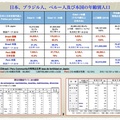When you see a title like this, you might get the impression that the human rights of foreigners are being significantly violated in Japan, but as a country governed by the rule of law, Japan defines the rights and obligations of its citizens and foreigners, and with the exception of the right to vote and some restrictions on economic activity, foreigners have almost the same rights.
Around the 1990s, when I first became involved in the issue of foreign workers, there were a series of human rights violations, such as employers forcibly taking away workers' passports, collecting exorbitant fees for visa applications, and some real estate companies and stores refusing to let foreigners into their stores. At first, there were many violations of labor laws and immigration laws, but when the unemployment rate rose due to the economic crisis, foreign workers suddenly became the target of dismissals and unilateral transfers, and it can be said that non-regular or indirectly employed foreign workers were hit hard, along with Japanese workers in the same situation. Of course, they may not have been the only targets of discriminatory acts, but they were certainly the first to be subject to personnel reductions. However, even in such a situation, due to business methods, temporary staffing and contracting companies desperately looked for work for foreign workers, even if it was unstable employment. When the economic situation worsens, companies are also forced to cut costs, but it is not always foreign workers who suffer as a buffer.
On the other hand, when we look back over the last 20 years, it seems that many of the problems with human rights were initially caused by ignorance or misunderstanding, but in cases where the situation was not corrected or improved at the early stages, the psychological and moral damage suffered by the victim may have been unbearable. In some areas, cases of refusal of entry to foreigners have escalated into lawsuits, with the plaintiffs (foreigners) winning. Even if there are differences in culture and customs, if the friction that arises from these differences is abandoned, it can often develop into discrimination.
When various ethnic groups and nationalities live together, misunderstandings will naturally occur even over trivial matters, but once they come to recognize that it is a place to learn from each other and that coexistence is essential to life, they can actually have a pleasant time (such as cooperation between communities for different purposes or planning immigrant festivals). However, if they think that they can complete things within their communities without coexistence, they will isolate themselves or lose contact with the majority of society, making it difficult to build a symbiotic relationship (for example, foreign settlements in the suburbs of Paris). There is always a risk when foreigners live together (in Argentina, Jewish and Lebanese immigrants prefer this type of living arrangement), but usually by the second generation of immigrants, their relationship with the host society will expand, and they will not only receive benefits from it, but also increase their rate of return to society. Japanese settlements overseas were initially quite closed, perhaps as a defense mechanism, but as they developed, they came to recognize the benefits and necessity of social integration, and now they are shouldering social responsibility and the responsibility for local development (for example, settlements in Paraguay and Bolivia). Although the population is small, it is now home to many more local people, and the small village has become a town and been recognized as a municipality, with the local people taking on part of the city's governance and administration as mayors and deputy mayors.
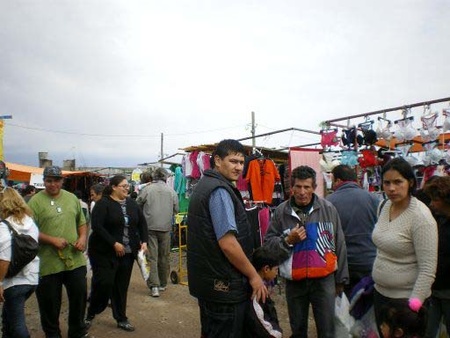
When foreigners immigrate to any country, they may face discrimination at first. It depends on how you perceive injustice, but in places like South America and Europe, where there is a lot of traffic between people of different nationalities and races, the baptism by those who arrived earlier can be quite harsh. This is because they are so desperate, and it is not easy to make the most of the limited possibilities.
In recent years, we often hear the term "hate speech," but this is not only due to misunderstanding or ignorance, but also to jealousy and envy. This is South America, and some of the expressions involve historical background and past events, but the fact that such reactions have occurred suggests that there may have been some unacceptable action. In many cases, the main conflict is with extremists or groups that make one-sided claims, but they are not people who can understand each other through discussion. It is not very meaningful to strengthen legal penalties only on the Japanese side for such issues. Considerable effort and response will be required from the countries and organizations, such as the opposing foreign groups.
I am a second-generation Japanese born in Argentina, and since kindergarten I had classmates of Japanese descent. Other than compulsory education in Spanish, I attended many Japanese language schools and Japanese Association events, so initially I had a strong sense of identity as a Japanese person. However, as I went on to junior high and high school, I became more aware of the importance of social norms, moral values (including religious values), customs and traditions, and by the time I entered university and began military service a year later, my national identity as an Argentinean had become quite established. Even though I have Asian features, I was able to act as a member of society without feeling out of place.
However, the values and discipline taught at home were completely Japanese, and sometimes they clashed with the general "common sense" of society (which is often uncommon in South America), and they sometimes found themselves troubled and in contradiction, or perceived unreasonable things as racism. My father was involved in two traffic accidents and was the victim, but only the claims of the local police and the bus company were recorded in the report, and in the end, even though he was left with after-effects, he did not receive a single peso in compensation. In the lawsuits of workers, only the claims of the plaintiff were prevailed, and the employers, Japanese immigrants, rarely won. It was difficult to get a good property for renting land or real estate, so they ran their businesses and lived in places that would rent to them. It was not uncommon for apartment contracts to sometimes require a year's payment in advance. And there were cases where students, no matter how well they performed in university or the military, were not able to become top of their class. There was a time when an invisible "high wall" was set up for them to enter the Foreign Service Academy (graduate school) to become a foreign service official, just because they were Asian. Nevertheless, many Japanese people overcame the discrimination they faced at the time and became accepted by the majority of society. Gradually, unreasonableness decreased, and the difference between being Japanese and Japanese-American became a great added value, making it possible to achieve things that were previously impossible. It took a century of patience and hard work, but the trials continue to this day, and are likely to continue to this day for the third and fourth generations.
More serious than racism in Latin America is the discrimination and inequality caused by unimaginable economic and social disparities. Hate speech-like expressions, which are currently a hot topic in Japan, have long been prevalent against low-skilled workers, slum dwellers, immigrants from neighboring countries, and rural people. On television programs, and among public figures such as journalists and reporters, and politicians, there is also a lot of derogatory and insulting language that denies the dignity of individuals. There is also a lot of satirical language, far beyond the realm of black humor. In this social environment, immigrants from many countries have pioneered new frontiers, but for my Japanese parents, it must have been a powerful experience, and there must have been more than a few things that were unbearable.
Last November (2014), I participated as one of the panelists in a symposium titled "Foreigners and Human Rights" held in Osaka, where I emphasized the importance of using differences to benefit society, even if you are a minority, by playing an active role. Japan is basically a monoethnic society, and general norms have their own logic and basis, and even if you have doubts, you cannot ask for major changes as long as they function as systems. Nevertheless, it can be said that the attitude of the government, media, industry groups, etc. toward foreign residents has changed considerably for the better over the past 20 years. Some foreigners are allergic to becoming Japanese, but I think that this is not about acquiring Japanese citizenship, but about understanding the structure of Japanese society, how to appeal to your own characteristics, and how to complement and give back to the Japanese people. Japanese companies and various systems seem to be poor at managing diversity, but this represents a great opportunity for foreigners who have received education and are living in Japan.
Discrimination and prejudice come from misunderstanding and ignorance, but fear of things that are difficult to understand is also a factor. Japanese people, who make up the majority, may think somewhere that they don't need to understand minorities very much. However, in order to deal with the current complex world situation and the many challenges we face, cooperation, collaboration, and coexistence may be more fruitful if they think that foreigners with different perspectives and approaches may be a positive presence.
Related Sites
http://www.moj.go.jp/JINKEN/jinken04_00101.html Ministry of Justice Human Rights Bureau
http://www.jinken.or.jp (Public Interest Foundation) Human Rights Education and Promotion Center
© 2015 Alberto J. Matsumoto


